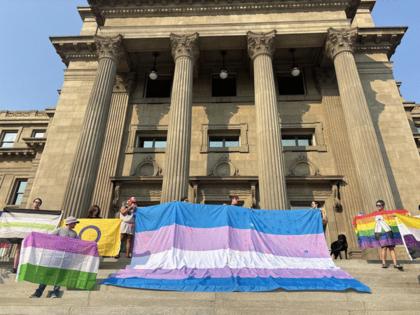Trans Idaho athlete tells US Supreme Court she's dropping her lawsuit. Here's why
Published in News & Features
BOISE, Idaho — The transgender Boise State University student who sued Idaho Gov. Brad Little over the state’s law banning trans women and girls from women’s sports has dismissed her case two months after the U.S. Supreme Court agreed to hear the issue.
Attorneys for Lindsay Hecox filed the “suggestion of mootness” with the Supreme Court on Sept. 2, informing the court that Hecox wished to withdraw her lawsuit “with prejudice” — meaning she will not be able to refile in the future. The filing suggests that the Supreme Court justices’ plans to hear the case are now moot since Hecox has withdrawn her complaint against Little.
Hecox wrote in a declaration as part of the filing that a large part of her decision to dismiss the case comes from her desire to focus on graduating from Boise State. She said she has faced “negative public scrutiny” since the start of the case.
“I am afraid that if I continue my lawsuit, I will personally be subjected to harassment that will negatively impact my mental health, my safety, and my ability to graduate as soon as possible,” Hecox said.
Hecox said she made the decision to stop playing club women’s soccer at Boise State and will comply with state law, which bars her and other transgender women from participating in women’s sports at public schools.
The ACLU of Idaho issued a brief statement Monday afternoon acknowledging the case’s dismissal and Hecox’s decision to prioritize her degree and personal safety. The organization also said it would “continue to advocate for the rights of all women and girls, including transgender women and girls.”
A spokesperson for the Idaho Attorney General’s Office did not immediately respond to a request for comment.
District, circuit courts called Idaho law unconstitutional
Hecox filed the lawsuit in April 2020, shortly after Idaho legislators passed the Fairness in Women’s Sports Act, which banned transgender women and girls from playing on women’s sports teams. At the time, Hecox was a freshman at Boise State University who hoped to run track, according to a profile on the case from the ACLU of Idaho, one of Hecox’s lawyers.
A U.S. District Court judge issued an injunction in the case in August 2020 that allowed trans female athletes to continue playing sports on women’s teams and found that the law was likely unconstitutional. When Idaho appealed, a 9th Circuit Court of Appeals judge reaffirmed the district court’s opinion.
Ninth Circuit Court Judge Kim Wardlaw said Idaho’s law unfairly targeted female students and subjected them to “an intrusive sex verification process” if anyone questioned their gender.
Idaho Attorney General Raúl Labrador in June asked the U.S. Supreme Court to review the case. It announced in early July that the case would be added to its docket.
The Supreme Court is hearing a similar case involving a West Virginia teenager during its October session.
_____
©2025 The Idaho Statesman. Visit idahostatesman.com. Distributed by Tribune Content Agency, LLC.







Comments